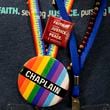The Braves didn’t play another game Tuesday night so much as they again attempted to answer the question, “OK, who’s a keeper?”
Because when a team is 20 games below .500 before the calendar flips to June, the safest thing a player can do is keep his head down, play hard and hope he’s not pushed off the plane somewhere over Toronto, like the remains of reliever Jason Grilli were before Tuesday’s game. (The Braves traded Grilli, agreed to pay most of his remaining contract and got back the most minor of minor league prospects, which tells you how much they wanted to dump Grilli.)
So about, “Who’s a keeper?” Possibly Mallex Smith.
He’s fast. He ranks second on the Braves in RBIs (granted, which is like ranking second on the Falcons in sacks). He has shown the potential to be an everyday player. That’s remarkable for a 23-year-old who has played only 43 major league games and didn’t even get serious about baseball until late in high school when he realized his professional football dream wasn’t going to happen.
"He's a football player learning to play baseball," Braves coach Terry Pendleton said of Smith, whose three-run triple triggered Monday's 5-3 win over San Francisco. "But he's grasping it."
The Braves' future doesn't hinge on Smith's development. But please note: While John Hart and John Coppolella have gone to great lengths to stockpile their farm system with pitching lottery tickets over the past several months, the organization is short of offensive prospects.
Woefully short. That's why Coppolella won't completely close the door to dealing starting pitcher Julio Teheran, acknowledging he could be tempted if another team offered an offensive weapon for the everyday lineup. (Coppolella told Fox Sports he would need to "overwhelmed" with a trade offer, but when a team ranks last last in runs and OPS, "overwhelmed" is relative.)
The Braves are choosing to move slowly with Smith. Interim manager Brian Snitker believes it’s too soon to move him into the everyday lineup, continuing to platoon him.
“I think he’s going to be an everyday, very good player,” Snitker said. “He’ll get the repetitions, he’ll get (to hit against) left-handers eventually. He’s picking up the game very fast.”
Fast is a word often associated with Smith. He’s probably the only Braves player who ranks as one of the slowest in his family tree.
His mother, Loretta, ran hurdles at Florida A&M. He has three siblings — one sister ran the 100 and 200 meters, another sister ran the hurdles (one also coaches track at USC) and his brother was a running back at Arkansas. His father, Michael, was a wide receiver at Florida A&M.
The advantages of growing up in athletic family go beyond genes. Smith’s parents never let him get a swelled head about his accomplishments.
One moment that stands out: When Smith cried after a middle school football practice because he learned he wasn’t going to start.
“I was in the seventh grade and my father came to pick me up,” he said. “I got in the car and I was crying — crying because I wasn’t starting. I was waiting to see if he had some kind of sympathy for me. Instead, he looked at me with anger and said, ‘If you’re going to cry, go take your pads and all of your stuff and give it back to them. I didn’t come here to pick up a crybaby.’”
Ouch.
Continuing …
“My father didn’t play with me (emotionally) growing up. There was no feeling sorry for yourself. There was no entitlement, even when I played on teams that my dad coached. I was always the last string until I earned my first-string spot. There was never something that was given to me.”
Smith, who came here as a part of the Justin Upton trade, was hitting .303 (23-for-76) with 10 extra-base hits over his past 27 games entering Tuesday night.
As unknown commodities go, he’s one guy to watch in an otherwise unwatchable season.





